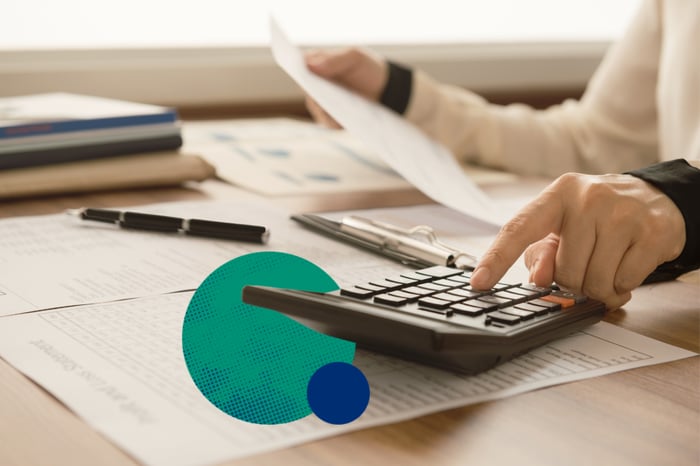A Certified Public Accountant (CPA) is a highly respected accounting professional who has met stringent criteria set by the American Institute of Certified Public Accountants (AICPA) and state Boards of Accountancy. Through education, work experience, and testing, CPAs have demonstrated expertise in areas like auditing, financial reporting, taxation, and ethics.
The most critical step to becoming a CPA is successfully passing the CPA Exam. It’s not something to take lightly. If you're interested in this career path, it's important to fully understand what this exam entails, including the eligibility requirements. We’ll guide you through everything you need to know to get started on your path to the CPA Exam.
What is the CPA Exam?
The CPA Exam, administered by the American Institute of Certified Public Accountants (AICPA), is a comprehensive assessment of knowledge and practical skills given to aspiring accounting professionals. It sets a high standard for those who wish to become licensed public accountants.
Candidates are evaluated in areas such as auditing and attestation, financial accounting and reporting, and regulation. There’s also a discipline section with three topics to choose from.
Passing the CPA Exam is a critical step in meeting the "four E's" of the criteria for becoming a licensed CPA: Education, Experience, Ethics, and Examination. Meeting these criteria — particularly examination — distinguishes certified professionals from individuals who may hold degrees or job titles related to accounting but lack the rigorous testing and ethical standards upheld by CPA credential holders.
CPA Exam Sections
There are four CPA exam sections, each four hours long. They’re administered separately, though they can be scheduled to be taken back to back. Each section contains multiple-choice questions (MCQs) and task-based simulations (TBSs).
The sections are divided into five testlets, with two of the testlets dedicated to MCQs and three dedicated to TBSs. The number of MCQs and TBSs on each testlet varies. Each section is scored between 0 and 100. A minimum score of 75 on each section is required to pass the entire exam. We’ll cover pass rates in more detail further down.
So, what exactly are candidates tested on?
Auditing and Attestation (AUD)
This section contains a total of 78 MCQs and 7 TBSs. Here, you’ll demonstrate your comprehension of the audit process and the duties of auditors. The AUD section covers a diverse range of subjects that are essential for ensuring the precision and dependability of financial data, including:
- Audit Procedures and Evidence
- Basic Economic Concepts: Supply and Demand, Business Cycles
- Business Process and Internal Controls
- Ethics and Professional Responsibilities
- Risk Assessment and Response
Financial Accounting and Reporting (FAR)
The FAR section contains a total of 50 MCQs and 7 TBSs. It covers a wide range of accounting knowledge, starting with basic principles and going all the way through more complex financial issues and reporting. Topics covered in this section include:
- Financial Reporting
- Financial Statements and Transactions
- Governmental and Non-Profit Accounting
- Select Balance Sheet Accounts
- Select Transactions
Regulation (REG)
Your REG section of the CPA Exam will include 72 MCQs and 8 TBSs and covers the legal and ethical sides of accounting practice. You’ll be tested on:
- Business Law
- Exercise of Incentive Stock Options (ISO)
- Federal Taxation of Entities
- Federal Taxation of Individuals
- Federal Taxation of Property Transactions
- Professional and Legal Responsibilities
Discipline Sections
The fourth section of your CPA Exam is known as the Discipline Section. There are three Discipline Sections to choose from, and candidates must choose one to complete their CPA Exam.
1. Business Analysis and Reporting (BAR)
BAR contains 50 MCQs and 7 TBSs. It covers:
- Business Analysis
- State and Local Governments
- Technical Accounting and Reporting
2. Information Systems and Controls (ISC)
The ISC Discipline Section contains 82 MCQs and 6 TBSs. Topics include:
- Considerations for Systems and Organization Controls (SOC) Engagements
- Information Systems and Data Management
- Security, Confidentiality, and Privacy
3. Tax Compliance and Planning (TCP)
Finally, you have the option to take the TCP, which includes 68 MCQs and 7 TBSs. Topics you’ll be tested on include:
- Entity Tax Compliance
- Entity Tax Planning
- Property Transactions (disposition of assets)
- Tax Compliance and Planning for Individuals and Personal Finance Planning
Removal of the Business Environment and Concepts (BEC) Section
Until 2024, the CPA Exam included a section called Business Environment and Concepts, or BEC, instead of the choice of Discipline Sections. This change is meant to keep the CPA Exam up to date with current industry demands.
CPA Exam Requirements
You can’t just take an accounting course and then sign up to take the CPA Exam. With the philosophy of the “four E’s” in mind, candidates must meet strict requirements and pay specific fees before even registering for the exam.
Eligibility
In general, eligibility requirements for the CPA exam encompass educational standards and work experience:
- A bachelor’s degree (120 credit hours) in accounting
- An additional 30 credit hours of post-graduate accounting education, usually a related master’s degree
- 1-2 years of supervised work experience under a certified CPA
- Be at least 18 or 21 years or older, depending on the state
- State residency is sometimes required, depending on where you’ll be taking the exam
It’s important to note that individual states may also have specific requirements. For example, in some states, a master's degree in law, finance, or accounting information systems satisfies the post-graduate eligibility requirements, while in other states, your master’s needs to be specifically in accounting. Make sure to check your state’s requirements before registering for the CPA Exam.
Cost
For those planning to take the CPA Exam, there are associated fees to be aware of. First, you need to have your educational credentials evaluated, which costs around $90. This evaluation reviews your academic transcripts and other educational documents to ensure your qualifications.
Once you’re deemed eligible, you’ll need to pay a fee for each section of the CPA Exam you take. The cost of each section varies by state but averages around $349.
Registering for the CPA Exam
Once you’re sure you meet the eligibility requirements for your state, it’s time to register to take the exam. Registration processing times vary, so be sure to give yourself at least a few months between when you start the process and when you plan to actually take the exam.
Once registered, you'll receive a Notice to Schedule (NTS), allowing you to schedule exam sections with Prometric, the official proctoring service for the CPA. You can register and pay for all sections at once or opt for individual section registrations.
It’s important to note that you have an 18-month window to pass all four parts of the exam, starting from the date you pass your first section. Plan your exam scheduling carefully within this timeframe to avoid forfeiting your registration fees.
How Hard is the CPA Exam?
The CPA exam is considered to be quite demanding, with each section requiring approximately 110-190 hours of study. Students can access test guides and even a sample test before the exam to boost their chances of passing.
Data from the National Association of State Boards of Accountancy (NASBA) suggests that the historical CPA Exam pass rates for first-time test takers range between 45% and 55%. Candidates can retake the exam as often as they need to but must pay new fees each time.
CPA Exam Logistics
Now that you have an idea of how serious the CPA Exam is, here are a few other important logistics to know once you’re registered and ready.
Canceling or Rescheduling Your Exam
If you need to adjust or cancel your CPA exam schedule, you can do so by visiting the Prometric site. Keep in mind that if you reschedule your exam within fewer than 30 business days of your appointment, you will be charged a $35 rescheduling fee. Canceling or rescheduling within 5 days of your first exam date incurs a fee of $84.84. Note that cancellations are not permitted, however, within 24 hours of your scheduled exam time.
What to Bring to the Exam
You finally made it to exam day! Here’s what to bring with you:
- One of the following forms of primary identification:
- A valid U.S. driver’s license
- A valid U.S. passport
- A valid state ID
- Valid U.S. military identification
- A valid driver’s license issued by another country. Must be signed and printed in English for testing staff to be able to verify that it’s valid and that the name matches the name on your Notice to Schedule (NTS).
- A valid passport issued by another country’s government if it includes a photo and the name matches the one on your NTS.
- One of the following forms of secondary identification with your signature:
- A valid credit card
- ATM card
- Debit card
- Any other form of valid government-issued identification that wouldn’t be accepted as your primary form of identification
- Your NTS
Be mindful that the following items are strictly prohibited at CPA exam testing centers:
- Books, Newspapers, or Magazines
- Briefcase
- Calculator/Portable Computer
- Calculator Watch
- Camera, Photographic, or Scanning Device (still or video)
- Cellular Phone
- Cigarette/Tobacco Products
- Container of any kind
- Dictionary
- Earphones/Earbuds/Headphones
- Eraser
- Eyeglass Case
- Food or Beverage
- Handbag/Backpack/Hip Pack
- Coats
- Hat or Visor (except head coverings worn for religious reasons)
- Headset or Audio Earmuffs (not provided by Testing Center).
- Jewelry – Pendant Necklace or Large Earrings
- Non-Prescription Sunglasses
- Notebooks
- Notes in any written form
- Organizer/Day Planner
- Outline
- Pager/Beeper
- Paper (not provided by Test Center)
- Pen/Pencil (not supplied by Test Center)
- Pencil Sharpener
- Personal Digital Assistant or Other Electronic Device
- Plastic Bags
- Purse/Wallet
- Radio/Transmitter/Receiver
- Ruler/Slide Ruler
- Study Material
- Tape/Disk Recorder or Player
- Umbrella
- Watch
- Weapons of any kind
During the Exam
Your NTS will contain the identification numbers for each section of the CPA examination, which also serve as the Launch Codes for accessing each section. You’ll need these Launch Codes to log in to the computer and begin your exam session.
Keep in mind that after entering your Launch Code, you'll have a strict 5-minute time limit to review the introductory examination screens. Exceeding this limit will result in automatic termination of the session, requiring you to leave the test center, forfeit fees, and reapply for the next testing window.
During the exam, there's no time built in for taking notes or engaging in other activities, so focus on reviewing and responding to the screens promptly.
Breaks
You'll have a standardized 15-minute break offered after the first task-based simulation testlet, which can be accepted or declined without affecting your testing time. Additionally, you can take breaks at the end of each testlet but cannot do so at any other time during the exam.
It's important to note that leaving the testing room without selecting the break option means you’ll be unable to return, and any breaks lasting over ten minutes will be reported to the Board of Accountancy.
Grounds for Dismissal
The Boards of Accountancy, NASBA, and the AICPA have strict policies regarding candidate misconduct, especially with regard to cheating on the CPA Exam. If found cheating, you face severe penalties such as grade invalidation, disqualification from future exams, and potential civil and criminal consequences. The NASBA has the authority to investigate misconduct cases using various sources of information, including confiscated items and your testing history.
During the exam, any suspicion of misconduct, such as communication with others, copying, or disrupting the exam environment, will result in a warning or immediate dismissal from the test center. Grounds for dismissal include repeated misconduct, attempting to remove exam materials, tampering with technology, or refusing to follow staff instructions.
These rules are in place to ensure fairness, integrity, and a safe testing environment for all candidates. As long as you follow the rules, your test should proceed smoothly.
After the Exam
After completing the CPA Exam, you can expect to receive your scores through the CPA Examination Services (CPAES) online portal. The AICPA and NASBA typically release scores on predetermined release dates, which occur roughly two weeks after the examination window closes. This allows you to receive your scores within a few weeks of completing the exam, providing timely feedback on your performance.
Earn Credits Toward a Bachelor’s Degree & CPA Exam Eligibility
Not only does StraighterLine offer individual accounting courses, but you can save significant money by enrolling in StraighterLine's Accountant Career Path Bundle.
The bundle conveniently combines the fundamental courses you'll need to advance through the accounting degree path, while offering you the freedom to complete the courses online at your own pace, and then transfer the credits you earn back to your school.
Enroll today to get started earning college-level accounting credits!
*All CPA Exam associated fees included in this article were accurate at the time of publishing. Note that prices are subject to change.












